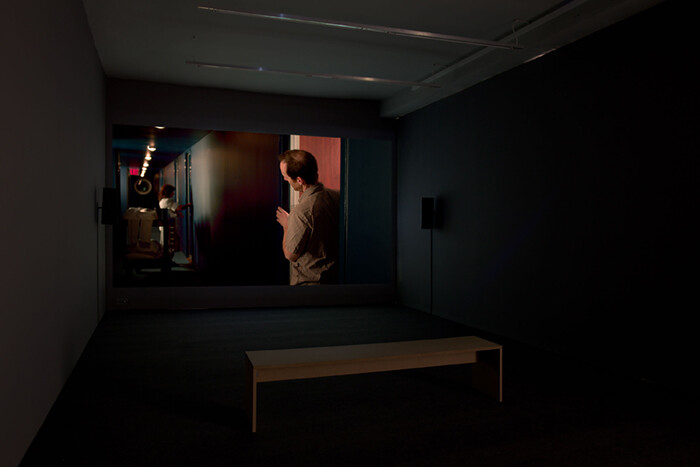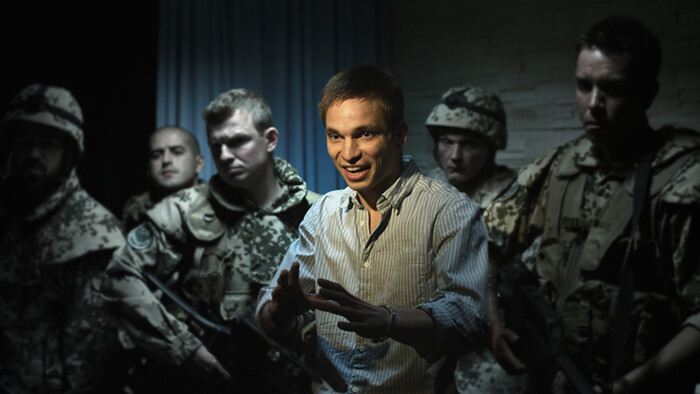In a world mediated by images, where the brutality of remote events is diluted by means of oversaturation and repetition, how does the real endure? And in the space of the cinema, where narratives are taken as spellbinding truths, what constitutes the real? When entering into the cinematic contract, we often abandon ourselves to fiction, falling into a suspension of disbelief that prioritizes one reality over another. This tacit agreement is the very substance of 5,000 Feet Is the Best (2011) and Continuity (2012), two films by Omer Fast on view at Arratia Beer that focus on the topic of war—a reality that transcends cultural divisions and dominates the collective global conscience—to expose structures of representation and the dissemination of information.
Installed in opposite corners of the gallery’s exhibition space, the two films are separated by walls whose bare supports remain visible, a practical decision that conveniently echoes the pivotal structural reveal taking place within each filmic narrative. First shown at the 2011 Venice Biennale, 5,000 Feet Is the Best stems from a series of conversations Fast conducted with a US Air Force Predator drone operator, who reflects on his daily duties and the psychological effects of live-fire missions in Pakistan and Afghanistan. The film weaves together vignettes with original footage from these interviews and their fictional re-staging. Like Velasquez’s insertion of his own self-portrait into the tableau of Las Meninas (1656)—one link in the “cycle of representation” that Michel Foucault so pointedly described in his essay on the work—Fast paints himself into the picture, cast as a journalist who quietly initiates a twisted documentation of war and its impact. The re-enactment of the original interview is in fact the distilled essence of the work: juxtaposed with its own source material, it becomes a thin veil through which we see two actors reciting a script for the camera. These real and fictive planes are harmonized in a singular poetic gesture when the film loop restarts and the pilot-actor recedes out of focus, a visual parallel to the actual drone operator’s blurred onscreen presence. In bearing its own naked skeleton and the mechanisms of representation intrinsically at play, the film sheds light on the layers of mediation by which the horrors of war zones enter the public sphere.
While 5,000 Feet negotiates the line between real and representational space, the more intimate film, Continuity (a much-discussed work at last summer’s Documenta 13), challenges what we come to believe as truth within any given narrative. At the core of the film is a single scenario in three variations with Daniel, a young German solider portrayed by three different actors returning home from deployment in Afghanistan. Hinging on an essential ambiguity, certain moments make the viewer question what is in fact possible in the face of residual trauma and the fight to regain normalcy after combat, as oedipal themes and overt sexual innuendos are woven into dinner conversation and battleground vignettes: in one scene, the mother engages her son in a heated kiss; in another, Daniel pops pills before dinner and later credits his obvious discomfort to the fact that he’s used to only being around men. Just as the interview dialogue in 5,000 Feet cues us into an embedded reality, these moments in Continuity betray a fact indispensible to Fast’s fiction: overcome with grief at the death of their son, Daniel’s parents have hired three young callboys to enact his homecoming in a disturbing effort to achieve some sort of emotional resolution.
Fast’s cunning mastery in Continuity is his manipulation of the viewer. What at first appears to be a traumatized family’s strained reunion opens up into a circuitous pattern of representation that shatters our suspension of disbelief. Slowly the three Daniels reawaken our latent knowledge that they are in fact actors impersonating a role within a role; they are the portal to our own world from the fictional realm, Velazquez’s mirror in which sovereign and spectator become one and the same. We are armed with an interpretative agency that is then put to the test when Fast bridges the beginning and end of the film’s loop with an appropriation of Jeff Wall’s 1992 photograph Dead Troops Talk (a vision after an ambush with a Red Army Patrol, near Morqou, Afghanistan, winter 1986). A telling mise-en-scène, Fast’s restaging of a staged photograph, itself a tableau of documentary war coverage, shows that reality is in fact only ever a construction.
It is in this reveal that Fast’s films contain a level of truth unparalleled by conventional news reports or documentary coverage. In directly engaging the usually passive cinematic viewer and exposing the scaffolding behind the fiction’s façade, Fast deftly sidesteps the cinematic contract. What opens up as a result is promising potential for the realm of aesthetics, evidence that something can produce meaningful political and ethical considerations while changing how we understand our own reality.







